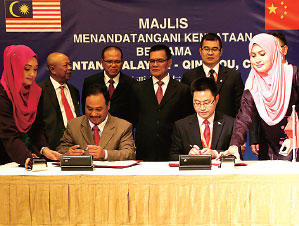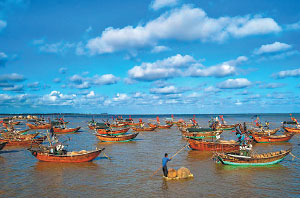Becoming a new frontrunner for intl cooperation
Since 2013, China has been implementing the Belt and Road Initiative, which promotes interconnectivity and has been accelerating infrastructure construction in Eurasia. For Qinzhou in Guangxi Zhuang autonomous region, that means a precious opportunity in its economic development, through greater cooperation with Chinese and foreign parties.
Located in the middle of Guangxi's coastal area, the city has more than 1,400 years of history. Qinzhou is at the center of the Guangxi Beibu Gulf economic zone, and in ancient times, it was one of the starting ports of the Maritime Silk Road. It is now a new strategic point of the 21st Century Maritime Silk Road.
The coastal city will play a leading role in Guangxi's construction of a free trade area, said Xiao Yingzi, Party chief of Qinzhou. The region will serve as a trade center for Southwest China with the Association of Southeast Asian Nations, he said.
Meanwhile, the Chinese and Malaysian governments have supported the China-Malaysia Qinzhou Industrial Park and the Malaysia-China Kuantan Industrial Park in Malaysia. To date, the China-Malaysia Qinzhou Industrial Park has received infrastructure investment totaling 2 billion yuan ($289.9 million), helping to establish basic facilities and complementary systems in the 7.87 square kilometers area.
The Qinzhou Industrial Park has already confirmed it will build five bases and platforms in cooperation with ASEAN, and Malaysia in particular, covering herbal and natural medicine research and production, optoelectronics, applied satellite technology, logistics, e-commerce and a startup incubator.
Qinzhou has also worked closely with Taiwan, with projects ranging from industrial enterprises to comprehensive agricultural development and new service sectors. By August 2015, there were 36 Taiwan enterprises in Qinzhou, and their contract value exceeded $400 million.
Xiao said that Qinzhou will use the advantages of China's opening-up policy to further attract enterprises from ASEAN countries, Hong Kong, Macao and Taiwan, to cultivate professional enterprises in the technological services, accounting, legal, assessment and exhibition sectors, and to help build an experimental zone for service trade cooperation in the Beibu Gulf area.
To serve that purpose, Qinzhou has constructed convenient sea, land and air traffic routes, according to Xiao. The city has built a dock with 300,000 metric ton capacity and eight container docks with 100,000 metric ton capacity each.
The city's sea route network covers not just ASEAN countries, but also directly connects to major distant seaports in the Middle East, Africa, Europe and the Americas. Moreover, it has a direct route to Kuantan port in Malaysia, which makes it possible to send goods to the country in four days, providing greater capacity for trading fruit and vegetables.
Qinzhou has already become a frontrunner of Guangxi's cooperation with ASEAN. Currently, Qinzhou directly cooperates with 47 ASEAN port cities and there is already a logistics network of sea transport, port industries and tourism in place.
Qinzhou's historical links with Southeast Asia date back to the Han Dynasty (206 BC-AD 220), when it served as a starting port of the Maritime Silk Road. As China and ASEAN deepen their collaboration, Qinzhou will play an ever more important role in the bilateral ties, improving cultural, economic and other links with ASEAN countries.
Earlier this year, Han Liu, deputy mayor of Qinzhou who is in charge of its publicity affairs, led a delegation of 75 people to Kuantan city of Malaysia to participate in the first Qinzhou Day friendship city event. In 2017, Qinzhou will hold a Kuantan Day event in return in order to extend the relationship between the two cities and deepen their cooperation.
In terms of culture and education, Qinzhou University is working with 25 higher education schools to cultivate talents with international education backgrounds, including universities in Malaysia, Thailand, Vietnam, Cambodia and Singapore.
zhuanti@chinadaily.com.cn
|
Han Liu (second right in front row), deputy mayor of Qinzhou, signs a friendly city contract with Malaysia's Kuantan Mayor Dato'Haji Fadzilla Bin Haji Salleh earlier this year. Photos Provided To China Daily |
|
Qinzhou's Sanniang Bay is a 4A tourist resort, and home to more than 200 wild white dolphins. |
(China Daily 12/01/2016 page24)
















